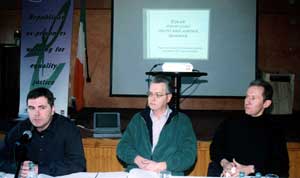29 January 2004 Edition
Roddy's hosts Truth and Reconciliation discussion

Mark Thompson of Relatives for Justice, Mike Ritchie of Coiste and Wilhelm Verwoerd of the Glencree Peace and Reconciliation Group
This past Saturday 24 January, the Roddy MacCorley Club in West Belfast was the scene of a lively two-hour discussion about future prospects for a Truth and Reconciliation Project in the Six Counties.
The event was organised by Coiste under the aegis of its Process of Nation building programme.
More than 70 people — from a wide range of families and republican communities throughout the North — turned up to participate in the exchange, which included presentations from Relatives for Justice spokesperson Mark Thompson, Coiste na nIarchimí's Mike Ritchie, and Wilhelm Verwoerd, from the Glencree Peace and Reconciliation Group in County Wicklow.
Verwoerd also has past experience as a researcher for the South African Truth and Reconciliation Commission.
Eolas — which comes from the Irish word for information — is an informal grouping of individuals and organisations from the nationalist and republican community who have joined together to launch a consultation paper on truth mechanisms. It is intended to draw people into discussions on how a formal truth process could be achieved in Ireland.
"One of the issues which arose during the course of the discussion is how likely it will be that prosecutions will arise from any truth mechanism which might be set up in the north," says Coiste's Mike Ritchie, "and whether there will be cases that republicans must also respond to.
"Eolas believes that all combatant groups would have to be involved, and that it is up to the people applying to the International panel to decide on the form of Truth and Reconciliation that's appropriate to their particular situation."
"More importantly, there must be agreement between all the political players. The only way this will work is if there is an atmosphere of political generosity and, for the time being, that remains elusive."
Best known example
There have been over 24 different formal truth processes throughout the world, the best known example being that of the South African Truth and Reconciliation Commission. The impetus behind this has been a legacy of severe abuse of human rights during a period of political conflict about which the truth has never been told.
"As the societies moved into a transitional phase, the unfinished business of the previous regime had to be tackled," states the Eolas discussion paper, which goes on to consider the advantages and disadvantages of different kinds of formal mechanisms.
However, local organisers point out that in Ireland, victims' issues have become almost a struggle in themselves. Republicans remain concerned that the violence of the oppressed could be equated with the violence of the oppressor, and that a healing consensus on these difficult issues will remain ambiguous if victims of state violence are ignored when a policy agenda is set up.
"That is one of the things that keeps coming up," agrees Ritchie. "And because the British are under pressure in a number of cases, there is a danger that they could rush through a process to suit their own purposes."
The next Eolas discussion on truth mechanisms for Ireland will be held in the Teachers' Club in Dublin on 10 February at 7pm. Additional discussions will be taking place at various locations in the coming months.
Anyone interested in facilitating future discussions should contact Coiste or check the Relatives for Justice website for more information.
